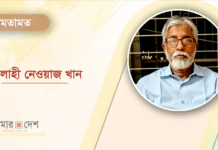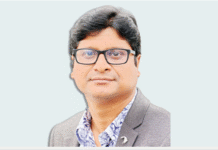
Supporters of the governing Awami League beat a supporter of the Bangladesh Nationalist Party at a protest in Dhaka on Sunday.
A growing sense of crisis gripped Bangladesh on Sunday as the government closed most forms of transportation into the capital, arrested hundreds and barred the main opposition alliance from holding a protest rally.
Police officers surrounded the home of the main opposition leader, Khaleda Zia, a former prime minister who leads the Bangladesh Nationalist Party, and prevented her followers from rallying outside the party’s headquarters in Dhaka, the capital.
Mrs. Zia had called for a “March for Democracy” on Sunday to protest the government’s decision to hold national elections on Jan. 5. The opposition coalition has demanded that the government step aside in favor of a caretaker administration to oversee the elections. But Prime Minister Sheikh Hasina, arrested by a previous caretaker government in 2007, has refused to step aside and has said that the elections will be held as scheduled.
The police parked at least five trucks filled with sand outside Mrs. Zia’s home and deployed water cannons alongside barricades. Mrs. Zia got into a white vehicle around 1:50 p.m. and tried to drive toward her party’s headquarters, but was stopped by a cordon of police officers. She sat in the vehicle for nearly an hour. She finally emerged holding the national flag and pleaded with police officers to allow her to proceed. They refused.
“The program to restore democracy will go on,” Mrs. Zia said to waiting reporters, according to local news media reports. “Either today or tomorrow or the day after tomorrow, the program will continue.”
Syed Ashraful Islam, the general secretary of the governing Awami League, mocked Mrs. Zia for “staging a drama” in her driveway.
The struggle between the two political coalitions has paralyzed Bangladesh, unnerved Western governments and wounded the country’s vital garment industry.
Mrs. Zia said the present government was “illegal and undemocratic.”
“They should step down immediately if they had any grace left,” she said.
At a news conference in Dhaka on Sunday, Muhammad Hafizuddin Ahmed, the vice chairman of the Bangladesh Nationalist Party, vowed that the opposition’s protests would continue daily until Jan. 5. He said the government had shut down Dhaka to prevent the opposition’s rally and was “going to kill democracy by organizing a one-sided, voterless election on Jan. 5.”
The police arrested Mr. Ahmed as he was leaving the news conference, one of many opposition figures arrested in recent days.
“The problem for the ruling party is that the voters in Bangladesh do not believe that a credible election can be held with the ruling party at the helm,” wrote Muhammad Q. Islam, an associate professor of economics at St. Louis University, in an opinion article published Sunday by an online newspaper in Bangladesh. “Her arguments for holding elections have failed to convince even her coalition partners, some of whom now have abandoned her, multiplying her problems manifold.”
Monirul Islam, joint commissioner of the Dhaka Metropolitan Police, said in a telephone interview that the police had refused the opposition coalition’s request to hold a rally on Sunday “to ensure the security of the people.”
“Despite the rejection of their application to hold a rally, they announced they would hold it today anyway,” Mr. Islam said. “We did not allow that to happen.”
One protester was killed in Dhaka on Sunday; political violence has claimed the lives of more than 100 people in recent weeks. In an attempt to stop the drive-by attacks, the police recently barred motorcyclists from carrying passengers, an extraordinary measure in a country where motorcycles are a dominant form of transportation and entire families routinely ride together.
Kelly McCarthy, a spokeswoman for the United States Embassy in Dhaka, told local reporters on Sunday that in a democracy all parties and citizens “have the right to freely and peacefully express their views.”
“The government is responsible to provide space to all political parties for such activity; equally the opposition is responsible to use such space in a peaceful manner,” Ms. McCarthy added, according to local news reports.
Source: nytimes









